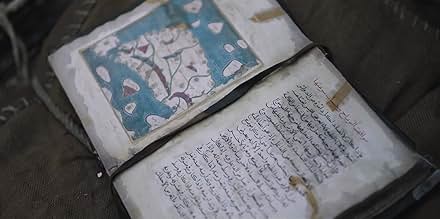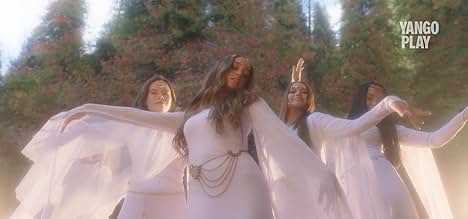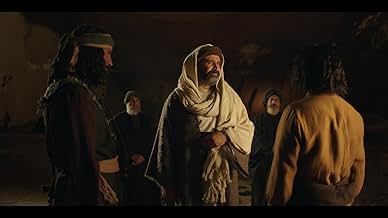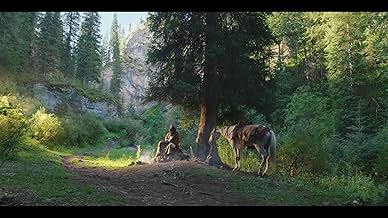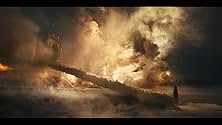VALUTAZIONE IMDb
7,4/10
2987
LA TUA VALUTAZIONE
L'XI secolo e l'emergere del leader del gruppo El Hashaashun, Hassan Al Sabah.L'XI secolo e l'emergere del leader del gruppo El Hashaashun, Hassan Al Sabah.L'XI secolo e l'emergere del leader del gruppo El Hashaashun, Hassan Al Sabah.
Sfoglia gli episodi
Recensioni in evidenza
First of all, I would like to thank the Egyptian crew who made this series. This should indeed have been made by Iranians, but our government is too busy with its corruption that Iran's history has the least importance, so we should be grateful that this series was made.
It is crucial to address the false claims made by some Iranians regarding this series. They argue that Hasan Sabbah is portrayed as an Arab, but it is clear that the actors identify themselves as Persians. It is essential to understand that during the time Iran was ruled by Arab rulers, people had converted to Islam, and most spoke Arabic as well as Parsi language. Hence, it is evident that the show accurately depicts the historical context of the period. Furthermore, the claim that Sabbah was against Islam is entirely baseless as he was a devout Muslim himself. Those who make such unfounded assertions should watch the series with an open mind and refrain from spreading misinformation.
It's important to remember that Khayyam's religious beliefs have been a subject of debate, but some have claimed that he was not a Muslim, he was though maybe not a practicing one and in one of the episodes, Sabbah himself stated that Khayyam will always live with doubt, just as he did, and challenged God and his justice in his poems.
Having watched the four episodes myself, I can confidently say that they haven't shown anything that insults us Iranians or our history..
As an Iranian, it's time to face the reality that our culture is not what it used to be 2500 years ago. We have been under Islamic rule for centuries now, and it has transformed us to be like any other Middle Eastern country. While we may not speak Arabic, the similarities are far more than the differences. It's time to accept this fact, if you don't like it, then change yourself first.
It is crucial to address the false claims made by some Iranians regarding this series. They argue that Hasan Sabbah is portrayed as an Arab, but it is clear that the actors identify themselves as Persians. It is essential to understand that during the time Iran was ruled by Arab rulers, people had converted to Islam, and most spoke Arabic as well as Parsi language. Hence, it is evident that the show accurately depicts the historical context of the period. Furthermore, the claim that Sabbah was against Islam is entirely baseless as he was a devout Muslim himself. Those who make such unfounded assertions should watch the series with an open mind and refrain from spreading misinformation.
It's important to remember that Khayyam's religious beliefs have been a subject of debate, but some have claimed that he was not a Muslim, he was though maybe not a practicing one and in one of the episodes, Sabbah himself stated that Khayyam will always live with doubt, just as he did, and challenged God and his justice in his poems.
Having watched the four episodes myself, I can confidently say that they haven't shown anything that insults us Iranians or our history..
As an Iranian, it's time to face the reality that our culture is not what it used to be 2500 years ago. We have been under Islamic rule for centuries now, and it has transformed us to be like any other Middle Eastern country. While we may not speak Arabic, the similarities are far more than the differences. It's time to accept this fact, if you don't like it, then change yourself first.
The episode is really good the scenes are wonderful there some few things that it make the episode not professional enough but I think it will be in the future the directory is Fantastic but the the writing of it not good enough , cgi is very good and I hope in the other episodes the writer make things professional than that and I hope that the story becomes more suitable in the main series of events and shows the dark sides of Hassan its powerful creature and I hope the actors give us great acting to add more greatness in the next episodes at the last the series is quite good see it you will enjoy.
This series is historically wrong and has betrayed history, the sorcerer woman and the rope and the choice of darkness are so ridiculous that there is no need for an explanation, but the covenant of the three friends between Omar Khayyam, Hassan Sabah and Nizam al-Mulk is nothing more than a legend, considering Their age difference is completely impossible, and their age difference is the most important factor, on the other hand, Malik Shah is presented as a wild and irresponsible person, while he was a just king who was betrayed by his uncle who marched against him at the beginning of the first reign. And then continued his father's expansion of the country, and during his time, Iran under the rule of the Seljuqs reached its greatest state during the Seljuk period. He was very interested in literature, poetry, science and philosophy, and this can be understood from the choice of Nizam al-Mulk as a minister, during his time, beautiful and extraordinary buildings were built in Iran, especially in cities like Isfahan, which are still in existence. As for Hasan Sabah, he took a path that he believed in. In his opinion, he was fighting for God and justice, and he was tormented by the division of lands and oppression of ordinary people, and he helped them a lot, although with harsh and many methods. Places of palaces and. The clothes in the series were more similar to Arabs, and this series was devoid of Iranian cultural elements, and the fact that the Selhouqians were the rulers of Iran and most of these coincidences do not happen in Iran, but except for a few times when someone says that they came from Persia, there is no mention of the issue. O Iran, that the Seljuqs ruled Iran and that Iran was united at that time, and most of these events happened within the borders of Iran at that time, many of which were part of Iran until two hundred years ago when Britain separated it to invent new countries. They were in Iran, and between the Khawarij and Daesh, he considers the Ismaili and Hassan Sabah terrorist groups to be the worst of all, for not paying attention to historical events. Not paying attention to Iran and Iranian culture, and not mentioning that the Seljuks and even Hassan Sabah were involved in Iran, and considering that the series even refused to mention that it changed some facts for more drama, I have to give points for these reasons. Reduce.
Why are Iranian reviewers here pretending as if 11th century Persians weren't Muslim, as if the show doesn't directly talk about Khayyam's skepticism, and as if Hassan Sabbah was somehow protecting Persia from Islam even though he was an Ismaeil Shia Muslim, and as if the show is somehow distorting history and masquerading Persians as Arabs? Iranians put their patriotism and their hate for Islam before anything, and judge the show immediately rather than actually watching it, and these reviews are probably spammed by people who have not watched the show. It has great writing, great acting, great production, great costumes, great music, better than anything I've seen in Arab media for a long time. Even though there some inaccuracies for dramatic purposes, it's a great achievement for Arab production.
Although Hasan Sabah was considered a controversial leader by many Muslims, he was undoubtedly a patriot who endeavored to undermine the Seljuks and Arabs in an effort to revitalize the Iranian empire. On the other hand, Hamid al-Ghazali, a devout Muslim, was strongly opposed to secular knowledge and philosophy, which led him to advocate against the spread of philosophical teachings among Muslims.
Moreover, there is a significant error concerning the supposed friendship between Khayyam, Hasan Sabah, and Nizam al-Mulk. Historically, Hasan Sabah was 17 years younger than Khayyam, and Khayyam was 21 years younger than Nizam al-Mulk, making it highly unlikely that these three dignitaries could have had a friendship.
Although the series is well-directed and cities like Samarkand and Isfahan are depicted beautifully, portraying Hasan Sabah as a villain does not seem fair.
Finally, I hope that someday a movie will truly portray Hasan Sabah accurately.
Moreover, there is a significant error concerning the supposed friendship between Khayyam, Hasan Sabah, and Nizam al-Mulk. Historically, Hasan Sabah was 17 years younger than Khayyam, and Khayyam was 21 years younger than Nizam al-Mulk, making it highly unlikely that these three dignitaries could have had a friendship.
Although the series is well-directed and cities like Samarkand and Isfahan are depicted beautifully, portraying Hasan Sabah as a villain does not seem fair.
Finally, I hope that someday a movie will truly portray Hasan Sabah accurately.
I più visti
Accedi per valutare e creare un elenco di titoli salvati per ottenere consigli personalizzati
Dettagli
- Data di uscita
- Paese di origine
- Sito ufficiale
- Lingua
- Celebre anche come
- El Hashaashun
- Vedi altri crediti dell’azienda su IMDbPro
- Colore
Contribuisci a questa pagina
Suggerisci una modifica o aggiungi i contenuti mancanti

